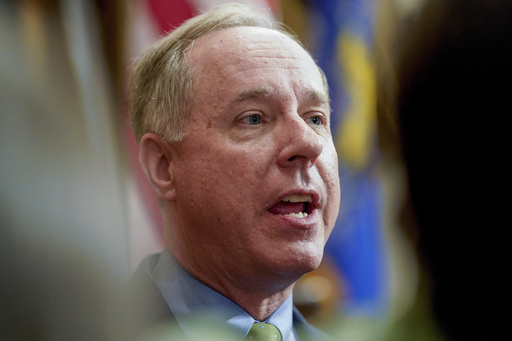MADISON, Wis. — On Tuesday, Wisconsin Republicans reappointed Robin Vos as the speaker of the state Assembly, marking a historical moment as he extends his tenure to the longest in the state’s history. Vos faced a challenge from a more conservative representative, Scott Allen, as well as notable Democratic gains in the recent elections, yet he successfully reclaimed his position.
As the speaker, Vos holds the most influential role in the Assembly, now presiding over the smallest Republican majority in nearly two decades. His opponent, Allen, had called for the impeachment of the state’s nonpartisan election director, a move Vos opposed. The vote to confirm Vos was conducted privately, and he did not disclose the specifics of the vote outcome during a subsequent press briefing, which Allen did not attend.
Vos’ leadership has often been challenged by certain factions within his party, particularly amid a tumultuous relationship with President-elect Donald Trump. Tensions peaked after the 2020 election when Vos declined to decertify President Joe Biden’s victory despite Trump’s insistence. In light of these conflicts, Trump endorsed Vos’s Republican rival in 2022 and his supporters initiated recall efforts against Vos, which ultimately did not succeed.
This year, Vos endorsed new legislative maps created by Democratic Governor Tony Evers. This decision stemmed in part from concerns that a liberal-leaning Wisconsin Supreme Court might impose more unfavorable terms for Republicans. The maps, which were approved by the legislature, allowed Democrats to narrow minor Republican leads in both the Senate and the Assembly, although a complete shift of power did not occur. The Republican majority in the Assembly decreased from 64-35 to 54-45, while in the Senate, it fell from 22-11 to 18-15. Throughout Vos’ speakership, Republican numbers have fluctuated between 60 and 64 seats.
Republican Assembly Majority Leader Tyler August assessed the recent election results for Democrats as “atrocious,” criticizing their inability to seize control despite the newly drawn maps that were designed to favor them. Nevertheless, the narrower margins might foster an environment for increased negotiations and compromises between the legislature and the governor’s office, highlighted by Vos’ comments on future legislative priorities.
However, Vos indicated that while Republicans would push forward with initiatives that enjoy wide consensus, such as tax reductions, more polarizing topics, notably the legalization of medical marijuana, would encounter greater challenges. Governor Evers, having maintained a distance from Republican leaders in previous sessions, expressed hope for more collaborative efforts moving forward.
In a social media message, Evers emphasized the importance of equitable maps and conveyed his eagerness to work alongside a legislature that is “more collaborative, more cooperative, and more responsive to the will of the people.” He is set to present a new two-year state budget early next year, building on last session’s achievements that saw increases in state funding for local governments and efforts to secure the future of the Milwaukee Brewers with an extended lease on American Family Field.
Last year, Evers signed a budget that included tax cuts, although not as extensive as those proposed by Republican lawmakers, and employed his veto powers to enhance funding for schools, a decision currently under legal scrutiny from Republicans. Evers is expected to advocate for numerous policies and financial initiatives that Republicans have thwarted in the past, including efforts for expanded paid family leave, Medicaid enhancements, marijuana legalization, and a raise in the minimum wage.
Additionally, last week Senate Republicans reelected Devin LeMahieu as their majority leader, while Senate Democrats reaffirmed Dianne Hesselbein as their minority leader on Tuesday. Assembly Democrats are scheduled to assemble on November 19 to determine their leadership going forward.


